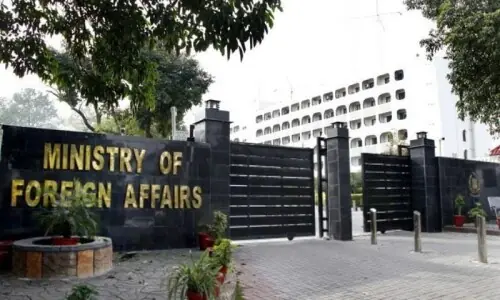INTERCESSION has become one of those controversial topics for which arguments are provided from both sides of the divide. The Quran says, “O you who believe! Fear Allah and seek a wasila to him”(5:35).
In Arabic ‘wasila’ stands for a link, a means to an end or an intermediary. ‘Tawassul’ or ‘shifa’a’, means intercession, or to seek a means to an end. It means to plead with somebody on behalf of somebody else, in this world as well as on the Day of Judgment. When the word ‘Shaafi’ is used for God, it means one who gives permission for intercession.
Many verses have been misunderstood out of context and some people think that the Quran contradicts itself and says in some places that intercession is valid and in others that it is not. According to the Quran, those denied intercession are the ones who did not believe, or those who transgressed: “The intercession of the intercessors will be of no use to them” (74:48), referring to those in hell. The Bani Israel are told, “Fear the Day (of Judgment when) … No fine will be acceptable and neither will any intercession be useful” (2:123).
Some verses which make it clear that without God’s permission and promise, no one can intercede, also reassure that intercession will take place: “They will have no (claim to) intercession, except for those who have the promise of the Most Merciful” (19:87; 34:23). No one can act as intercessor except by His leave (10:3; 2:255; 21:28). “On that Day no intercession will matter other than his whom Ar-Rehman grants permission and accepts” (20:109). The Makkan belief that their idols would intercede for them is refuted (30:13).
God tells the Prophet (PBUH): “And in the night, pray the tahajjud, which is additional for you for soon your Lord will raise you to the Station of Praise (Maqam Mehmud)” (17:79). Recited in the middle of the night, this prayer was made obligatory for the Prophet, but is voluntary for his followers. The Prophet’s “Station of Praise”, will be the highest human station on the Day of Judgment.
A hadith states that on that day people will be running to and fro looking for an intercessor, until they come to the Prophet Muhammad, who will answer, “I am for intercession”. The Lord will then ask him to “...intercede, for your intercession will be heard” (Bukhari).
One of the titles of the Prophet is ‘shaafi’, one who performs intercession. Other spiritual leaders who will act as intermediaries will be prophets, martyrs, huffaz of the Quran, angels and pious people whom God deems fit. Prophet Jesus’ intercession for his people on the Day of Judgment is mentioned in the Quran (5:16-18).
According to Tirmidhi, Ibn Majah and others: “A blind man came to the Prophet and said: ‘I’ve been afflicted in my eyesight, so pray to Allah for me’. The Prophet said: ‘Go and perform wudu (ablution), perform two rakat salat and then say: “O Allah! I ask you and turn to you through my Prophet Muhammad, the Prophet of Mercy. O Muhammad! I seek your intercession with my Lord for the return of my eyesight, that it may be fulfilled. O Allah! Grant him intercession for me”. The Prophet then said: ‘And if there is some other need, do the same’.”
Tawassul can be carried out through a living as well as a dead person, as it refers to the permanent, positive status attached to that person, living or dead. Uthmaan ibn Hunayf taught this prayer to someone long after the Prophet’s death.
Praying to God for a particular need, using some honourable personality, such as the Prophet and other righteous believers, as a wasila or intermediary, without supplicating to that person, or thinking that he has the power to provide, is permitted by the four schools of the Sunni fiqh. Even Ibn Taymiyah believed that God would allow the Prophet and the spiritual leaders to intercede for believers. Since they will be alive on Judgment Day, their intercession will be effective.
If a person supplicates directly to the deceased, believing that the prophets and pious persons are independently in possession of the power to provide, then this would be shirk or polytheism, and would be equal to assigning partners to God in his attribute of Al Razzak or The Provider.
There are various types of intercessions: first, through the beautiful names (attributes) of God — “Allah has beautiful names, so call unto Him through them” (7:180). Second, through the good deeds of the person. Three people were trapped in a cave.
Each made a supplication to God to accept their prayers due to some good deed that each had done (Bukhari). Third, requesting the living, righteous people to pray for them, and, four, to make tawassul to God through the rank of certain individuals in the sight of Allah, alive or dead.
A distinction between the living and the dead in this matter is like believing in the perishing of the souls at the time of death.
This is tantamount to denial of resurrection. The intercession on Judgment Day will be like grace marks given by God to a believer who tried but could not come up to the desired level. It will be the pleading by one to whom God gives permission, only for the one for whom God gives permission: “In God’s power is complete intercession” (39:44), and all power belongs to God.
The writer is a scholar of the Quran, and writes on contemporary issues.
nilofar.ahmed58@gmail.com






























